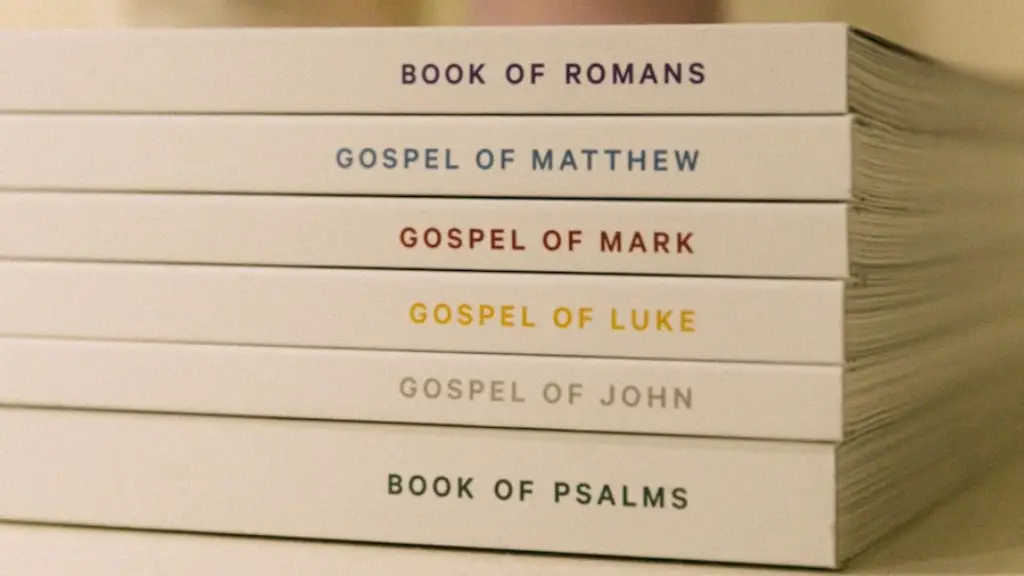Noah’s story is one of the more legendary tales of the Bible, as he was chosen by God to be the savior of mankind. The biblical account of Noah’s story, which can be found in both the Old and New Testaments, is one of the most significant and widely known stories of humanity. Noah is a central figure in Christian mythology and is often referenced in sermons and in other religious works.
The biblical story of Noah is mentioned in the books of Genesis, 1 Chronicles, and Isaiah in the Old Testament. In the Old Testament account, God informed Noah of his plans to flood the world and instructed him to build an ark to save his family, as well as pairs of all animals, from the coming deluge. After completing the ark, according to the bible,God brought a flood that lasted for 40 days and 40 nights, destroying all life on earth except for what was inside the ark.
In the book of Genesis, Noah was a righteous and blameless man, who walked with God and obeyed all the Divine commands. This act of faith and obedience along with building the ark made Noah one of the great heroes of the Bible. Noah is also credited with being the first to plant a vineyard and produce wine, and is believed to be the father of three great nations – Japheth, Ham and Shem.
Noah’s story is also present in the New Testament. In Luke 17:26-27, it is quoted by Jesus as an example of God’s judgment. Also, in 1 Peter 3:20, Noah is mentioned in connection with the faith he displayed in the building of the ark and his deliverance from the Flood.
Noah’s story is among one of the most iconic stories from the Bible, and can be found in both the Old and New Testaments. The story is significant for its symbolism of faith, obedience, and hope. It is an example of God’s mercy and justice and is a reminder of our need for righteousness and trust in Him.
Noah in Jewish Culture
In Jewish culture, Noah is often seen as an archetypal figure of obedient faith, humility, and gratitude. He is often used as an example of how one should behave in the face of adversity and how faith in God will be rewarded. Also, the Talmudic references to Noah in the Midrash show him as a great rabbi and teacher who continued to teach and spread knowledge even after the Flood.
The rainbow is an important symbol in the Noah story and is a reminder of God’s promise to never again flood the world. In the Jewish culture, it is seen as a sign of peace and divine protection, and is often found on artistically designed Torah scrolls.
Noah is also a symbol of justice, as he was chosen by God for this task of saving the world due to his righteousness. He also symbolizes hope, in that he was able to find a way to save his family from the Flood and start anew.
Noah in Popular Culture
Noah’s story has been a source of inspiration for many books, films and other pieces of art. It has been adapted for different age groups and themes. For example, in the 2014 movie, Noah, by Darren Aronofsky, Noah is depicted as someone who perseveres against all odds to do what he thinks is right. He is a symbol of strength, courage and faith in the face of adversity.
Noah’s story has also shaped much of popular culture. He is a popular figure in children’s books, toys and cartoons. For example, Noah and the Flood is a popular choice for Sunday school classes as it teaches children about faith, obedience and hope.
In all forms of media, Noah has been depicted as a courageous, faithful and righteous individual who is willing to do what is right in the face of danger and uncertainty. He is an inspiring figure, who has been remembered and revered throughout the ages.
Noah’s Impact On Society
Noah’s story has had a tremendous impact on society and is an important part of many cultures. His story is seen as a reminder of God’s mercy and justice, and of our need to trust and obey Him. It is an example of how faith and obedience can be rewarded, even in the face of uncertainty and danger.
At the same time, Noah’s story is also seen as a warning about the consequences of disobedience, as those who turned a deaf ear to the warnings of God were destroyed by the Flood. It is also a reminder of our need to show justice, mercy and kindness to all of God’s creation.
Noah’s story has been an inspiration for many throughout the ages. It is seen as an example of hope and courage, as well as an important reminder of human’s need for faith, obedience and trust in God.
Noah and Environmentalism
Noah’s story has recently become intertwined with the modern environmental movement. His story is seen as a warning about the consequences of human actions and a reminder of the need to act responsibly and protect the environment. Environmentalists point to Noah’s story as an example of how humans can be held responsible for their actions and how we can be judged by our actions.
Environmentalists also point out the importance of Noah as an example of how human beings can be stewards of the environment and take responsibility for preserving the planet. Many people interpret the story of Noah’s ark as a symbolic representation of the need to take care of the environment and to protect it from environmental destruction.
Noah’s story is an important part of our cultural heritage and a reminder of the need for faith, obedience, and stewardship. It is also a reminder that human beings have the power and responsibility to act responsibly and take care of the environment.
Noah and Evolutionary Thought
As scientific understanding and knowledge has advanced, evolutionary thought has become intertwined with the story of Noah. Some theologians and Biblical scholars have suggested that the flood was a way to introduce evolutionary thought into the biblical narrative and provide an explanation for the diversity of life on earth.
Others have suggested that Noah was a legendary figure who was part of an evolutionary transition between early human hunter-gatherer societies and more advanced agrarian civilizations. These theories suggest that Noah and his descendants were the “ancestors” of the larger populations of the world and were responsible for the transition from hunter-gatherer to agricultural societies.
Noah’s story is a reminder of the importance of faith and obedience, as well as a reminder of the power of the human spirit to overcome adversity and strive for greatness. It is also a reminder of the need to take personal responsibility for our actions and to act responsibly towards the environment.
Conclusion
Noah’s story is one of the most iconic stories from the Bible, and can be found in both the Old and New Testaments. It is a reminder of our need for faith, obedience and trust in God, as well as a reminder of our responsibility to take care of the environment. It is also a reminder that human beings have the power and responsibility to act responsibly and take care of the environment.





